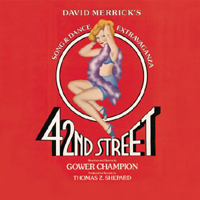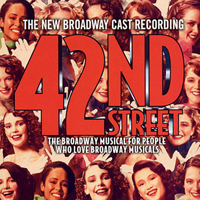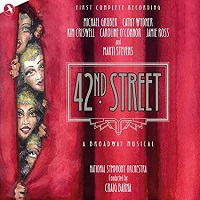 Original Broadway Cast, 1980 (RCA)
Original Broadway Cast, 1980 (RCA)  (2 / 5) This wasn’t the first Hollywood musical to be adapted to the stage, but its success established a trend that has reached well into the 21st century. Whether or not this trajectory is a good thing will always be a cause for argument. The Broadway incarnation of 42nd Street was the final work of Gower Champion, whose death was announced in a shocking and showman-like gesture by producer David Merrick immediately following the opening-night bows. Champion had transformed the movie into an enjoyable theatrical pageant with nonstop glitter, an occasional nod to Busby Berkeley, and very little of the film’s drive and desperation. Fueled by all that audience-grabbing spectacle and song, the production ran for years, but its manufactured nature is pretty obvious on the cast recording. The Harry Warren-AI Dubin score has been padded out with songs from other films, and the wonderful period sound of the original Warner Bros. orchestrations has been replaced with the expert playing of a punched-up pit band. Fortunately, there are some seasoned pros in the cast– Jerry Orbach, Tammy Grimes, Lee Roy Reams, and Carole Cook — to provide true musical theater resonance. In the role of Peggy Sawyer, the chorine-promoted-leading-lady who’s told “you’re going out there a youngster, but you’ve got to come back a star,” Wanda Richert is sweet and sings better than Ruby Keeler. (Of course, it can also be said that coyotes sing better than Ruby Keeler.) There are things to enjoy in this recording, even though we might wish that the gifted Champion had expended his final energies upon something more substantial. — Richard Barrios
(2 / 5) This wasn’t the first Hollywood musical to be adapted to the stage, but its success established a trend that has reached well into the 21st century. Whether or not this trajectory is a good thing will always be a cause for argument. The Broadway incarnation of 42nd Street was the final work of Gower Champion, whose death was announced in a shocking and showman-like gesture by producer David Merrick immediately following the opening-night bows. Champion had transformed the movie into an enjoyable theatrical pageant with nonstop glitter, an occasional nod to Busby Berkeley, and very little of the film’s drive and desperation. Fueled by all that audience-grabbing spectacle and song, the production ran for years, but its manufactured nature is pretty obvious on the cast recording. The Harry Warren-AI Dubin score has been padded out with songs from other films, and the wonderful period sound of the original Warner Bros. orchestrations has been replaced with the expert playing of a punched-up pit band. Fortunately, there are some seasoned pros in the cast– Jerry Orbach, Tammy Grimes, Lee Roy Reams, and Carole Cook — to provide true musical theater resonance. In the role of Peggy Sawyer, the chorine-promoted-leading-lady who’s told “you’re going out there a youngster, but you’ve got to come back a star,” Wanda Richert is sweet and sings better than Ruby Keeler. (Of course, it can also be said that coyotes sing better than Ruby Keeler.) There are things to enjoy in this recording, even though we might wish that the gifted Champion had expended his final energies upon something more substantial. — Richard Barrios
 Broadway Cast, 2001 (Atlantic)
Broadway Cast, 2001 (Atlantic)  (1 / 5) Two decades after the original show was a smash, the revival did it all over again. Done in “tribute” to the original Champion staging (i.e., they stole the best parts), this 42nd Street was even more spiffed-up and brassy. There’s an intense air of overkill here, those relentless tapping feet even more threatening than in Busby Berkeley’s original “Lullaby of Broadway” number. “Shuffle Off to Buffalo,” in particular, is a vulgar nightmare, but several other cuts are also objectionable. Fortunately, a genuine star performance emerges from the excess: Christine Ebersole, who won a Tony for her work as the fading diva Dorothy Brock. Amid a herd of screechers and belters, Ebersole is the classy, real thing. For her trouble, she is rewarded (and rewards the listener) with an added song, “I Only Have Eyes for You.” Onstage, Michael Cumpsty seemed miscast in the Warner Baxter/Jerry Orbach role, and he sounds equally uncomfortable on the recording. As for Kate Levering, she serves up chilly efficiency in place of Ruby Keeler’s clunky charm. If you want modern-day Broadway brass, it’s here in spades; if you’re looking for something more, play the Ebersole tracks and then go out and rent the movie. — R.B.
(1 / 5) Two decades after the original show was a smash, the revival did it all over again. Done in “tribute” to the original Champion staging (i.e., they stole the best parts), this 42nd Street was even more spiffed-up and brassy. There’s an intense air of overkill here, those relentless tapping feet even more threatening than in Busby Berkeley’s original “Lullaby of Broadway” number. “Shuffle Off to Buffalo,” in particular, is a vulgar nightmare, but several other cuts are also objectionable. Fortunately, a genuine star performance emerges from the excess: Christine Ebersole, who won a Tony for her work as the fading diva Dorothy Brock. Amid a herd of screechers and belters, Ebersole is the classy, real thing. For her trouble, she is rewarded (and rewards the listener) with an added song, “I Only Have Eyes for You.” Onstage, Michael Cumpsty seemed miscast in the Warner Baxter/Jerry Orbach role, and he sounds equally uncomfortable on the recording. As for Kate Levering, she serves up chilly efficiency in place of Ruby Keeler’s clunky charm. If you want modern-day Broadway brass, it’s here in spades; if you’re looking for something more, play the Ebersole tracks and then go out and rent the movie. — R.B.
 Studio Cast, 2022 (JAY, 2CDs)
Studio Cast, 2022 (JAY, 2CDs)  (2 / 5) In view of the fact that 42nd Street is a thoroughly retro Broadway show based on a very old, seminal, “backstage musical” movie, featuring songs taken from that flick and various others plus huge amounts of dance music, the property seems rather an odd choice for a complete score recording. This is one of several JAY releases that have had extraordinarily long gestation periods; according to notes on the company’s website, “JAY commenced the first complete recording of the original version of the musical with the original orchestrations by Philip J. Lang at Abbey Road Studios, London on October 5, 1996 and completed it at Clinton Recording Studios, New York on October 19, 1996. It was released on April 8, 2022.” There are enjoyable performances by Marti Stevens as Dorothy Brock, Cathy Wydner as Peggy Sawyer, and Kim Criswell as Maggie Jones. Michael Gruber, with his beautiful baritenor, sounds great in Billy Lawlor’s numbers, but as Julian Marsh, Jamie Ross lacks the vocal authority that Jerry Orbach brought to “Lullaby of Broadway” and the title song. The chorus sings very well, thankfully without British accents, and many listeners will enjoy hearing the National Symphony Orchestra, conducted by Craig Barna, playing this music — especially the bigger and brassier pieces, such as the overture. In common with JAY’s other musical theater recordings, the sound quality and mixing here are superb, and Wydner as Peggy deserves a nod for supplying some nifty solo tap sounds. — Michael Portantiere
(2 / 5) In view of the fact that 42nd Street is a thoroughly retro Broadway show based on a very old, seminal, “backstage musical” movie, featuring songs taken from that flick and various others plus huge amounts of dance music, the property seems rather an odd choice for a complete score recording. This is one of several JAY releases that have had extraordinarily long gestation periods; according to notes on the company’s website, “JAY commenced the first complete recording of the original version of the musical with the original orchestrations by Philip J. Lang at Abbey Road Studios, London on October 5, 1996 and completed it at Clinton Recording Studios, New York on October 19, 1996. It was released on April 8, 2022.” There are enjoyable performances by Marti Stevens as Dorothy Brock, Cathy Wydner as Peggy Sawyer, and Kim Criswell as Maggie Jones. Michael Gruber, with his beautiful baritenor, sounds great in Billy Lawlor’s numbers, but as Julian Marsh, Jamie Ross lacks the vocal authority that Jerry Orbach brought to “Lullaby of Broadway” and the title song. The chorus sings very well, thankfully without British accents, and many listeners will enjoy hearing the National Symphony Orchestra, conducted by Craig Barna, playing this music — especially the bigger and brassier pieces, such as the overture. In common with JAY’s other musical theater recordings, the sound quality and mixing here are superb, and Wydner as Peggy deserves a nod for supplying some nifty solo tap sounds. — Michael Portantiere

